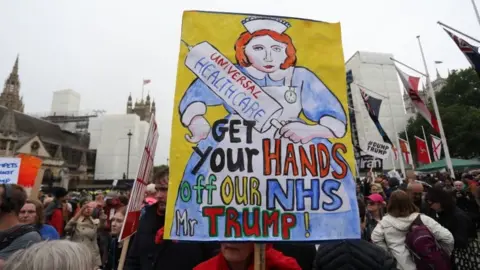General election 2019: Could the NHS be "up for sale"?
 Getty Images
Getty ImagesThe starting gun has been fired, the election campaign is under way and the future of the NHS has dominated the opening lap of the contest. If the early exchanges are anything to go by, health will feature prominently in the campaign.
Labour has for some time argued that the NHS is vulnerable to privatisation under the Conservatives. The party has developed a new attack line, that any post-Brexit trade deal with the United States will open the door to big American health corporations. It has also picked up on suggestions that the US authorities will demand that the NHS pays more for drugs supplied by American companies.
In essence, Labour is alleging that the NHS is not safe after a Brexit presided over by the Tories.
"Up for sale"?
The Conservatives have strongly denied that the NHS is in any way "up for sale". They argue that there will be red lines with the British position in any trade talks, which protect the current status of the health service and the drug purchasing regime.
Fuelling this row was a documentary by Channel 4 Dispatches which asserted that the price the NHS pays for US medicines could rise steeply in any future trade deal with the United States. The programme reported that "drug pricing" had been discussed in six initial meetings between trade officials from the UK and the US and that there had been "secret meetings" between the pharmaceutical companies and British civil servants.
In response to the programme, the government said: "We could not agree to any proposals on medicines pricing or access that would put NHS finances at risk or reduce clinician and patient choice."
President Trump has made no secret of his frustration that US drug corporations can in many cases charge American health providers more for their products than what the NHS pays.
This is because the US health system is market-based, and insurers are more ready to pay the asking price.
The NHS in England relies on the advice of the medical cost watchdog NICE, on what offers the best benefits for patients balanced against value for money.
Wales and Northern Ireland tend to follow NICE rulings, while Scotland has its own equivalent, the SMC.
The NICE regime, introduced 20 years ago, is seen as a great success in helping the NHS strike realistic pricing deals. A recent deal for the cystic fibrosis drug Orkambi was hailed by health leaders in England as a big win for the system, with the American manufacturer Vertex, having initially refused to bring down its price, eventually signing up. The Scottish Government had already done its own deal.
The NHS has immense bargaining power because of its size and its centralised control over drug availability is always attractive to pharmaceutical companies who are keen to be part of that market.
So the suggestion in some quarters is that the American negotiators will demand that higher prices are paid to US pharmaceutical companies, potentially adding damaging extra costs to the already stretched NHS budget. The response by the Conservatives is that no British government would knowingly agree to something which added billions of pounds to public spending.
So what about private provision in the NHS? There is evidence that the number of contracts awarded to private organisations by NHS commissioners has increased. But these have tended to be for smaller service deals, and a more rounded picture is gained by looking at the overall spending numbers.
Increased privatisation
The proportion of government health spending in England going to private providers has risen by more than three-quarters in the last decade and now stands at 7.3%, according to official figures for 2018/19.
But that rate has remained little changed for the last few years.
Labour says this is evidence of creeping gains made by the private sector winning NHS contracts. The Conservative response is that private provision also rose rapidly under the last Labour government, which outsourced some routine surgery to private hospitals.
Current rules allow American and other foreign firms to bid for NHS contracts if they have a European subsidiary. The US company United Health owns Optum, for example, which provides IT and research services to some NHS organisations.
It is conceivable that in any trade talks, US negotiators would demand a more streamlined bidding process to open up access. It should be noted, however, that the head of NHS England, Simon Stevens, has called for an end to any competitive tendering.
When Mr Trump visited the UK in June, he said the NHS would form part of negotiations over a possible future trade deal between the UK and US. The next day, he rowed back from those remarks.
When asked in his radio interview with LBC, whether the NHS would feature in trade talks, President Trump said: "We wouldn't even be involved in that, no. It's not for us to have anything to do with your health care system."
The Conservatives argue that it simply would not be on the table. But it is impossible to be certain at this stage what precisely would or would not be in the mix when the negotiators get to work after Brexit.
